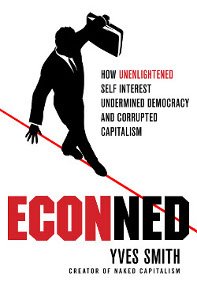
By Yves Smith in Naked Capitalism
– Yves Smith is the author of: ECONned: How Unenlightened Self Interest Undermined Democracy and Corrupted Capitalism –
Double Dip Recession Talk Bustin’ Out All Over
I’ve been quite mystified at all of this “double dip” recession talk, even though I suppose it beats the “V shaped recovery” talk. Both presuppose that we had a recovery underway, the real sort, not the type that is mainly the artifact of inventory restocking, halting and sometimes covert stimulus, (like hiring unprecedented numbers of Census workers, cash for clunkers and home purchase tax credits to induce consumers to accelerate investments) and a weaker dollar than has since gone in the reverse direction.
While employment is a lagging indicator, you need to have a realistic prospect of meaningful hiring to talk of recovery. Small business was pretty much the only engine of job growth in the last expansion. Small businesses are now credit starved and suffering, and their prospects seem unlikely to turn in a meaningful fashion anytime soon.
And these concerns were operative before the sucking sound of deflation coming out of Europe had become a major part of the mix.
Some sightings of the new caution include Marketwatch:
The unexpected decline in May’s retail sales has many economists questioning the strength and durability of the nascent recovery…it was pretty much across the board — even if you exclude autos.
On the surface, this seems at odds with consumers’ attitudes. The latest survey of consumer sentiment shows a better-than-expected gain.
However, by historical comparisons, consumer moods are still fairly dour. And at any rate, these consumer surveys are not a good predictor of how much people actually spend….consumers are increasingly reluctant to open their wallets…They tend to frequent big-box stores and other discount outlets — and only when these merchants run big sales.
This hunkering down extends to consumers in all income brackets.
Another cheery report comes from BNP Paribas (hat tip reader Scott):
“I see quite a lot of market participants who talk about economic figures and corporate figures still being strong, which are, to a large extent, rational arguments,” he [Philippe Gijsels, the head of research at BNP Paribas] said.
“The only problem with these figures is that they give a rear view mirror perspective. They give us a valuable inside about the past, but fail to answer the question how much the economies in the US and even more so in Europe will slow down in the second half of the year and going into 2011,” Gijsels said.
What of those who say valuations are cheap? He has less sympathy for this argument.
“If we compare the price earnings valuations with the recent past, markets look attractive. However, when we look at stock market history, we see that valuations follow a regime switching pattern. A P/E of 15 can be the average for 15 years and it can drop to an average 8 for the next 15 years,” he said.
“Unfortunately you never know in what regime you are investing. And if people start to use bond yield/earnings yield arguments as an argument to buy this market, I invite them to look at this indicator in Japan over the last 20 years.”
David Rosenberg of Gluskin Sheff, who despite his generally dour outlook did get bullish for a short while, is back to being downbeat:
The smoothed ECRI leading economic index fell in the opening week in June for the fifth week in a row and now down in nine of the past ten. The index, went from +0.3% to -3.5%, the weakest it has been in a year. After predicting the V-shaped recovery we got briefly in the inventory-led GDP data when the index soared off the bottom in late 2008, at -3.5%, we can safely say that this barometer is now signalling an 80% chance of a double-dip recession. It is one thing to slip to or fractionally below the zero line, but a -3.5% reading has only sent off two head-fakes in the past, while accurately foreshadowing seven recessions — with a three month lag. Keep your eye on the -10 threshold, for at that level, the economy has gone into recession … only 100% of the time (42 years of data)
It would be nice for this to be over, but the history of severe financial crisis is that that recovery is longer in the making than in a normal recession, and tends to be weak in the absence of cleaning up bank balance sheets. Yet the aggressive “green shoots” boosterism and other forms of cheerleading by the officialdom plus optimistic interpretations of data were persuasive for a while.
ATTENTION READERS
We See The World From All Sides and Want YOU To Be Fully InformedIn fact, intentional disinformation is a disgraceful scourge in media today. So to assuage any possible errant incorrect information posted herein, we strongly encourage you to seek corroboration from other non-VT sources before forming an educated opinion.
About VT - Policies & Disclosures - Comment Policy



